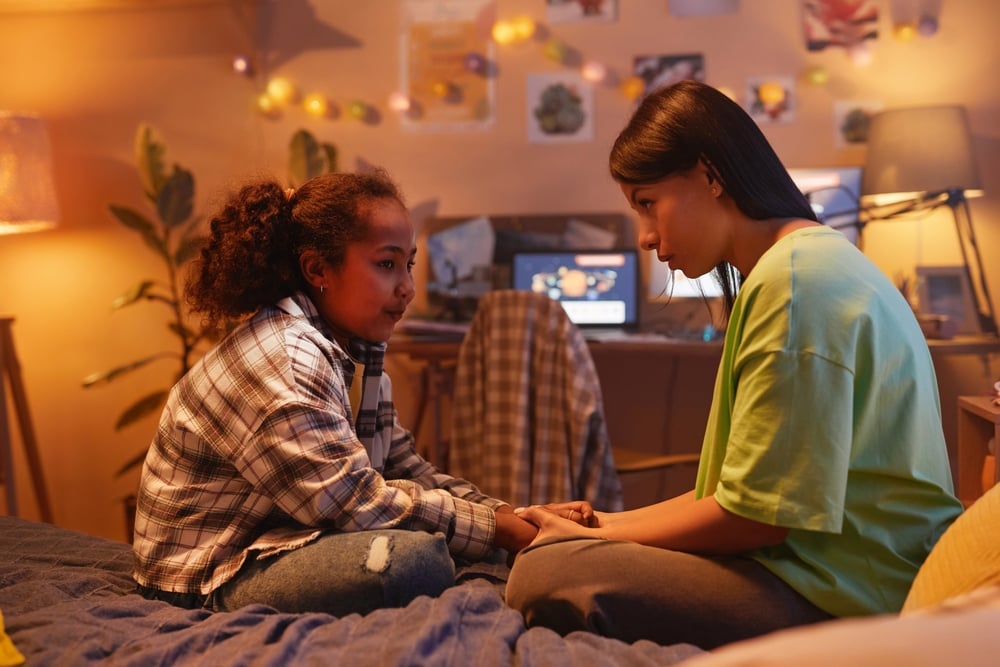When ears open, hearts follow.

Advice used to be handed down like heirlooms—firm, direct, and often unsolicited. But Gen Z didn’t come into a world that rewards passive obedience. They were raised amidst mental health movements, identity explorations, and digital overload. What worked for previous generations feels tone-deaf to them, especially when it’s wrapped in lectures and life lessons they didn’t ask for.
The secret to reaching them isn’t louder voices or more persuasive arguments. It’s listening—actively, empathetically, and without judgment. When a Gen Z kid feels heard, they respond with surprising openness. Conversations shift from defensive standoffs to moments of connection. The urge to correct may be strong, but pausing to listen can build trust in ways advice never will. In a world where everyone’s trying to be understood, the rare power of true listening is exactly what these kids need most.
1. Listening shows respect for their independence.

Gen Z places high value on autonomy and self-expression, as stated by the Pew Research Center. Unlike past generations that were taught to conform early, this group has grown up being told they have a voice—and they expect it to be heard. Listening validates that independence and helps establish mutual respect rather than a hierarchy of authority.
When adults constantly lecture, it sends a message that young people can’t be trusted to think critically. Gen Z notices this, and it often leads to shutdowns or resistance. Listening instead says, “Your ideas matter here.” It doesn’t mean agreeing with everything, but it does foster a sense of partnership rather than parental control. That respect opens doors that lectures tend to slam shut.
2. Active listening helps reduce anxiety and isolation.

Gen Z reports higher rates of anxiety, depression, and loneliness than previous generations. In many cases, this stems from feeling overwhelmed or misunderstood in a world that moves too fast and demands too much, as reported by the American Psychological Association. Being genuinely listened to offers relief—they don’t have to fix everything, they just want to feel seen.
Listening without immediately offering solutions can be surprisingly healing. It creates space for emotions to land safely. Lecturing, even with good intentions, often feels dismissive or invalidating. But when a Gen Z kid gets to express frustration without being corrected, the weight starts to lift. Sometimes, the connection they’re craving begins with someone simply letting them speak.
3. It opens the door to honest conversations.

Adolescents are more likely to share openly when they don’t fear judgment or interruption, as mentioned by the Harvard Graduate School of Education. Gen Z, in particular, values emotional safety and transparency. Listening quietly, with curiosity rather than critique, signals that honesty will be met with compassion.
Once they know they won’t be immediately shut down, conversations deepen. They’ll talk about real struggles—friendship drama, identity questions, academic pressure. But if every talk turns into a mini TED Talk on life choices, they’ll stop sharing. The best insights don’t come from being taught—they emerge naturally in a space where both parties feel heard.
4. It strengthens the bond more than advice ever could.

Connection isn’t built in lecture halls—it’s forged in everyday moments of understanding. When Gen Z feels emotionally safe, they lean in. They trust more. They remember how it felt to be taken seriously, even if their perspective was messy or incomplete.
Adults may want to offer wisdom right away, but pausing to listen communicates something deeper: unconditional presence. Over time, that reliability becomes a foundation for stronger relationships. The advice can come later, and it’ll land better if the emotional groundwork is already there. Genuine connection grows in the quiet moments between answers.
5. Listening helps decode their digital world.

Social media, memes, and online slang are second nature to Gen Z, but completely foreign to many adults. Listening helps translate that world. Instead of demanding explanations or judging their choices, simply being open to hearing about their experiences online can lead to surprising insights.
Understanding their platforms, even at a basic level, shows willingness to meet them where they are. It’s not about mastering TikTok trends—it’s about asking, “What do you like about this?” or “What makes that funny to you?” Listening builds a bridge, one algorithmic rabbit hole at a time.
6. It reduces the pressure to be perfect.

Gen Z lives in a world of constant comparison. Every achievement, failure, or outfit is measured against a curated feed of someone else’s best moments. That pressure adds up. When conversations are full of advice and correction, it can reinforce the feeling that nothing is ever good enough.
But when they’re simply listened to—without judgment or commentary—they feel allowed to be human. That relief encourages them to share their struggles, fears, and self-doubt more freely. It’s not about fixing them; it’s about reminding them they don’t have to be fixed to be loved.
7. Listening teaches emotional intelligence by example.

Young people learn how to manage emotions not through lectures, but by observing how others respond in tough moments. When someone listens with patience and empathy, it models what emotional regulation looks like. Gen Z is watching closely—not just what’s said, but how it’s said.
By showing calm, non-reactive listening, adults demonstrate skills that can’t be taught in a list of rules. It sets a tone for how to treat others—and themselves—when feelings get complicated. Those moments of quiet presence are more educational than any speech on maturity.
8. It invites shared problem-solving instead of rebellion.

Gen Z doesn’t respond well to top-down commands. When conversations feel one-sided, the natural reaction is to push back—or tune out entirely. But when listening takes the lead, a new dynamic emerges. Solutions become collaborative, not dictated.
Asking questions like “What do you think might help here?” shifts the focus from control to curiosity. It empowers them to take ownership of their lives while still valuing input. When mutual respect drives the conversation, defiance often melts into dialogue. That shift changes everything.
9. It honors their sense of justice and fairness.

Gen Z is often described as the most justice-minded generation in recent history. They care deeply about equity, inclusion, and authenticity. Listening to them—even when opinions clash—communicates a willingness to wrestle with difficult truths rather than dismiss them.
When adults default to lectures, it can feel like a shutdown. But listening opens the floor to mutual understanding, and maybe even growth on both sides. That kind of relationship feels fair. It values each voice. And in a generation that’s grown up questioning authority, fairness speaks louder than rules.
10. Listening builds patience and trust on both sides.

It’s not always easy to sit through long pauses, wandering thoughts, or dramatic sighs. But patience pays off. Over time, the willingness to listen creates space for trust to grow. Gen Z isn’t in a rush to share—they’re waiting to see if it’s safe to be vulnerable.
That kind of trust isn’t won with the perfect piece of advice—it’s earned by staying quiet long enough to hear what’s really going on. The effort it takes to be present signals commitment. That’s what makes the difference, not quick fixes or polished speeches.
11. It helps reveal what they aren’t saying out loud.

Often, the most important things aren’t shouted—they’re hinted at in half-finished sentences, eye rolls, or long silences. Listening closely means picking up on what’s beneath the surface. It’s about hearing tone, noticing shifts, and respecting pauses as part of the story.
That subtlety is where the real connection lives. By giving space and paying attention, adults can gently uncover the worries, hopes, or questions that Gen Z doesn’t know how to express yet. That kind of listening is a skill—and one that brings relationships to an entirely different level.
12. Listening keeps the door open when things get hard.

When life gets complicated—grades drop, friendships implode, mental health dips—Gen Z often retreats. If past interactions have felt like lectures, they’re unlikely to reach out. But when listening has been the norm, the door stays open.
It’s in the hardest moments that previous listening pays off. A trusted adult who’s shown respect before is more likely to be the one they come to in a crisis. That emotional safety net isn’t built overnight. It’s stitched together slowly, through quiet conversations that start long before anything goes wrong.
